Why Does My Car Shake When Driving Over 70 MPH? [20 Reasons Why]
April 7, 2023
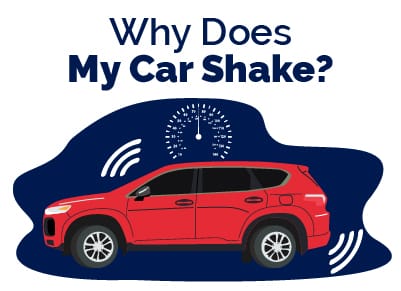

I am a serial entrepreneur and a consumer advocate. When I’m not helping car buyers, I love working on ventures that have a positive impact.
I run a cause marketing agency and serve on the board of Vayu Global Health where we are disrupting the medical industry and preventing the needless deaths of mothers and babies during childbirth.
One of the scariest, most stressful moments as a car owner is feeling your car shimmy and shake as you pick up the pace on the highway.
Shaking cars often display this behavior at higher speeds, like 70 mph or greater.
Our experts did the research and found that the confusing part is that shaking does not necessarily mean that a car is neglected or old. There are multiple reasons why a vehicle can shake at higher speeds, many of which are related to brakes and steering, with the most common issue being bent wheels.
Check out our list of the best car-related subreddits for more mechanical advice.
Table of Contents
- Key Takeaways
- Top Reasons for Car Shaking When Driving Over 70 MPH Video
- 1. Tire Imbalance
- 2. Wheel Misalignment
- 3. Faulty Brake System
- 4. Wear & Tear on Parts
- 5. Low Tire Pressure
- 6. Starved Engine
- 7. Overworking the Powertrain
- 8. Runout Wheel
- 9. Engine Sludge
- 10. Tough Driving Conditions
- 11. Problems After Vehicle Service
- 12. Gasoline Octane Issues
- 13. Loose Air or Vacuum Hose
- 14. Spark Plug Issues
- 15. Too High of Lift
- 16. CV Joint Issues
- 17. Suspension Part Problems
- 18. Uneven Tire Wear
- 19. Exhaust Resonance
- 20. Manufacturer Issues
- How to Fix a Car That Shakes When Driving
- Conclusion
- Best Car Deals by Category
- Frequently Asked Questions
Key Takeaways
- The most common reasons for a car shaking over 70 mph are related to brakes and steering issues
- Top reasons for car shaking once you reach 70 mph include bent wheels, tire imbalance, wheel misalignment, and a faulty brake system
- Since a shaky car can be caused by so many different things, it's best to get your car checked out at a mechanic who can make necessary repairs if you experience this issue
Top Reasons for Car Shaking When Driving Over 70 MPH Video
1. Tire Imbalance
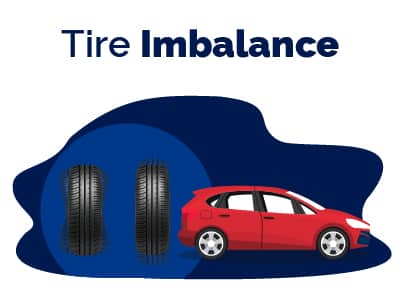 One potential cause of a shaking car is imbalanced tires. If this is the cause, you’ll only notice the shaking at speeds around 50-70 mph.
One potential cause of a shaking car is imbalanced tires. If this is the cause, you’ll only notice the shaking at speeds around 50-70 mph.
Examine the tires and look for a cupped wear pattern, where some sections are more worn than others. Steering wheel vibration typically comes from front tire imbalance, whereas seat or floor vibration is more likely from the back tires.
If you think this may be the issue, then a professional should assess and correct your tires as needed.
2. Wheel Misalignment
If you hit a pothole or other rough road conditions, it can misalign your wheels. This is another common reason for a car shaking over 70 mph.
The best course of action is to bring in your vehicle for an alignment inspection if you notice any signs of misalignment. This way, a professional mechanic can accurately align your wheels.
3. Faulty Brake System
Issues with the brake system can also cause shaking around 50 mph or greater. If you have sticky brake calipers, you may notice a vibration in the steering wheel around these speeds, and the vibration worsens around 70 mph. Another tell-tale sign is a rancid burnt smell when you stop the car.
If a faulty brake system is an issue, then you’ll need to re-index the rotor, machine the brake parts, or potentially replace worn brake parts. Also, make sure to check your brake pressure and whether the ABS pump works properly.
4. Wear & Tear on Parts
Wear and tear on other parts of your vehicle can also cause the car to vibrate at 70 mph or above. Some worn parts that can cause shaking include:
- Shocks
- Upper Strut Bearings
- Ball Joints
- Tie Rod Ends
Wheel alignment may be able to identify wear in these parts. Replacing the worn parts can help address the shaking issue.
5. Low Tire Pressure
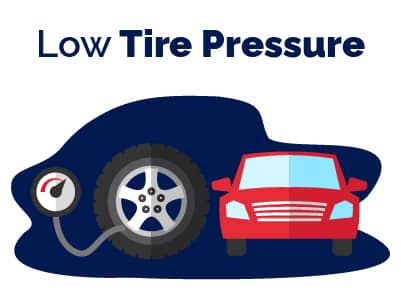 Low tire pressure is another potential culprit of car shaking. Tire pressure can drop if there is a leak in the tire. Additionally, back and front tires experience different wear and may require fill-ups at different times.
Low tire pressure is another potential culprit of car shaking. Tire pressure can drop if there is a leak in the tire. Additionally, back and front tires experience different wear and may require fill-ups at different times.
To help prevent low tire pressure, keep a tire pressure gauge and inflator with you. Another helpful tip is to keep the tire pressure three psi above the manufacturer's suggestion in cold weather.
6. Starved Engine
Your car’s engine requires sufficient oxygen and spark to run smoothly. If it does not get the fuel, oxygen, or spark needed, you can experience shaking at higher speeds. Specifically, you may notice shaking in the engine compartment.
Check your spark plugs and install new ones when needed. This may help you resolve the issue. Furthermore, check your air filters and fuel filters. Clean and replace them regularly to prevent engine starvation.
7. Overworking the Powertrain
If your powertrain is overworked, it may produce a clicking noise while turning. Additionally, CV axle shaft problems will also produce shaking when you attempt to brake. If there’s excessive wear on your flywheel, gearbox, clutch, or steering rack, it can also cause shaking.
If your car is shaking above 70 mph, be sure to have your powertrain assessed for any of the above issues.
8. Runout Wheel
Runout wheel is when your tire or wheel assembly is not completely round. One example is a tire with a broken belt.
Overall, this issue will cause significant rattling at highway speeds. Use a tire runout gauge or off-car balancer to assess this issue.
9. Engine Sludge
Over time, engine oil deposits can build up. Eventually, they can form a sludge that coats your engine. This sludge is not good for your vehicle, and it can affect your vehicle’s power and even cause shaking. At the same time, a low oil level prevents the engine from getting the lubrication it needs, which can also cause it to vibrate.
The best way to prevent engine sludge or low oil is to change your oil based on your manufacturer’s recommendation.
10. Tough Driving Conditions
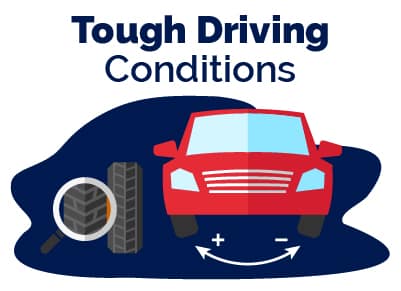 Both the road conditions and driving style can impact how your car feels. While it can be hard to take responsibility, it’s important to take a look at your own driving style. Rough driving may include going at much higher speeds than you should or roughly handling the steering wheel/throttle.
Both the road conditions and driving style can impact how your car feels. While it can be hard to take responsibility, it’s important to take a look at your own driving style. Rough driving may include going at much higher speeds than you should or roughly handling the steering wheel/throttle.
All of this puts additional stress on your vehicle and key components and makes it more likely that you will hit something hard (like a curb) and damage your vehicle.
11. Problems After Vehicle Service
Did the car shake just start after your last maintenance or repair? Wheel alignments, tire replacements, and other repairs are often followed by new shaking issues. There’s always a chance that you experience poor workmanship or an error from the repair shop.
If this new issue popped up soon after your last appointment, consider bringing your vehicle back to have the mechanic examine their previous work.
12. Gasoline Octane Issues
Always use fuel with the octane rating that your manufacturer recommends. Using fuel with too high of an octane rating may be good for efficiency and emissions, but it can harm your vehicle. Higher- Octane gas burns slower, which means you need to choose the right one for your engine.
When your engine receives gas with too much Octane, it cannot burn the fuel correctly and therefore may shake.
13. Loose Air or Vacuum Hose
A leaking air or vacuum hose lets fuel, air, and spark out of the engine in the incorrect proportions. The incorrect air pressure confuses your vehicle’s sensors, which can lead to power loss and vibration.
Keeping your air and fuel filter clean and properly working is crucial for this power delivery. You should replace the air filters according to your vehicle’s instructions. However, your fuel filters may require servicing, depending on their location.
14. Spark Plug Issues
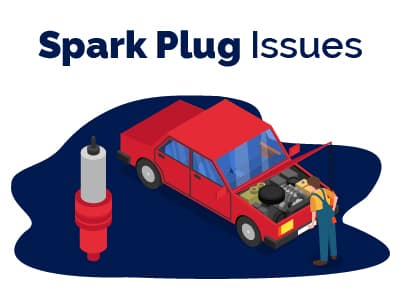 If your spark plugs are dirty or broken, they affect the engine’s internal pressure. This causes power loss and forces the remaining cylinder to work harder. The result can be anywhere from a mild vibration to excessive shaking at higher speeds. You may even notice a minor bounce when the vehicle is standing still.
If your spark plugs are dirty or broken, they affect the engine’s internal pressure. This causes power loss and forces the remaining cylinder to work harder. The result can be anywhere from a mild vibration to excessive shaking at higher speeds. You may even notice a minor bounce when the vehicle is standing still.
Take a look at your vehicle’s RPM gauge to identify a failing spark plug early on, and replace it as soon as possible.
15. Too High of Lift
Too high of a driveshaft angle leads to cyclic vibrations. This can happen when your vehicle’s stock ride height is raised or lowered several inches too far. The angled U-joint causes shaft vibrations. Therefore, the steeper the angle, the stronger the vibration.
16. CV Joint Issues
It’s not always easy to identify CV joint problems, specifically in rear-wheel vehicles. Heavy loads or hard acceleration can cause inner CV joint problems. The severity of the issue can affect the degree of shaking you feel.
If the shaking starts around 40-55 mph, you may have extreme issues with your front axles.
17. Suspension Part Problems
Vibrations that start between 50 and 75 mph could be from your suspension, especially if it gets worse as you pick up the pace. Worn suspension and differential mounts may be the cause.
If the suspension is severely damaged, it may be in your best interest to replace the vehicle.
18. Uneven Tire Wear
Tires may wear unevenly when you have broken or slipped a belt. New cars are not immune, especially because poor-quality tires can wear out quickly.
A tire assessment can help expose this issue. If you experience uneven tire wear, then you’ll need to replace them and fix the underlying cause.
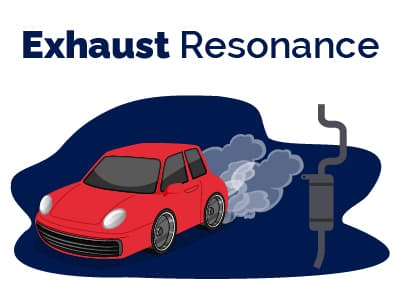 19. Exhaust Resonance
19. Exhaust Resonance
After you change your vehicle’s exhaust system, you may experience resonance. It can seem similar to wheel vibration. Resonance is when naturally-occurring fluctuations in the exhaust add up to create a buzz.
20. Manufacturer Issues
Some cars simply experience manufacturer faults that lead to shaking. A missing body piece could be the culprit, or an extremely light car affected by nearby drafts could. Some vehicles don’t handle high speeds well.
Manufacturing errors and quality can certainly lead to shaking at higher speeds.
How to Fix a Car That Shakes When Driving
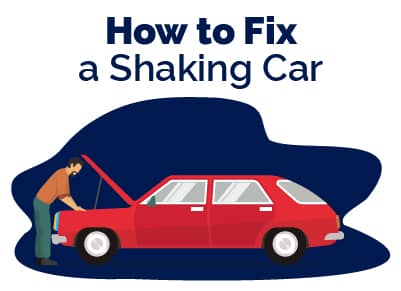 The first step to fixing a car that shakes when driving is to identify the cause. Based on the list above, many issues are related to the wheels and brakes, however, some may be related to the engine. Pay attention to where you notice the shaking to pinpoint a system to check on.
The first step to fixing a car that shakes when driving is to identify the cause. Based on the list above, many issues are related to the wheels and brakes, however, some may be related to the engine. Pay attention to where you notice the shaking to pinpoint a system to check on.
In most cases, you’ll need to bring your vehicle to a professional repair facility unless you have a background in cars. Explain the issue and what you believe may be the cause. Note any relevant recent events (accidents, potholes, previous work done, etc.).
Based on the results of the inspection, you can determine if you will hire the repair facility to complete the repairs, perform the repair on your own, or replace the vehicle.
Conclusion
If you experience shaking over 70 mph, don't panic! The issue is likely caused by tire or brake system problems. It's best to see a mechanic to accurately diagnose and fix the problem, as these issues usually require professional attention.
Best Car Deals by Category
Frequently Asked Questions
Is it safe to drive when your car is shaking?
It may be safe to drive a car that’s shaking for a little bit, but it is not advised. A shaking car indicates that there is a problem. The specific cause of the problem determines how dangerous it is to drive, but since many issues are related to wheels and brakes, driving at higher speeds while your car is shaking is not a good idea.
Why is my car shaking when I drive?
There are several reasons why your car may shake when you drive. Problems with the wheels/tires, brakes, and engine are the most common.
What causes my steering wheel to shake when driving over 70 mph?
One potential cause of your steering wheel shaking when driving over 70 mph is out-of-balance front tires or uneven tires. Have your tires checked if you experience shaking in your steering wheel when driving at higher speeds.
Why does my car shake when I accelerate?
Several different issues may cause your vehicle to shake as you accelerate, including problems with tires, axles, spark plugs, and vacuum hoses.
Why does my car shake when I brake?
A faulty brake system could cause your vehicle to shake as you brake. If you notice this, you should get your car inspected as soon as possible, as brake issues can be very dangerous.
Posted in Car Buying Tips |





